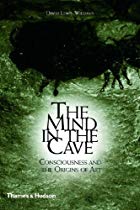 Heaven above, Hell below, and the level of anxious humanity in between appear in one form or another across the globe. Why should this be so? In the materiality of daily life there is, after all, no evidence whatsoever of hidden spiritual realms above and below. (David Lewis-Williams, The Mind in the Cave, p.144)
Heaven above, Hell below, and the level of anxious humanity in between appear in one form or another across the globe. Why should this be so? In the materiality of daily life there is, after all, no evidence whatsoever of hidden spiritual realms above and below. (David Lewis-Williams, The Mind in the Cave, p.144)
David Lewis-Williams, in his pioneering The Mind in the Cave, argues that the universally held beliefs of a three-tiered cosmos, with spirit worlds above and below the here and now of daily life, are best explained by the wiring of the human brain, in altered states of consciousness, to generate the experience such a cosmos.
Laboratory experiments and reports from “an extremely broad range of shamanistic (and other) societies” point to this near universal concept originating in certain experiences of an altered state of consciousness.
The ubiquity of institutionalized altered states of consciousness is borne out by a survey of 488 societies included in Murdock’s Ethnographic Atlas. Erika Bourguignon, who carried out this survey, found that an overwhelming 437, or 90 per cent, of these societies were reported to have ‘culturally patterned forms of altered states of consciousness’. She concluded that ‘the capacity [necessity] to experience altered states of consciousness is a psychobiological capacity [necessity] of the species, and thus universal, its utilization, institutionalization, and patterning are, indeed, features of cultures, and thus variable.’ (p.131)
Lewis-Williams adds that the Ethnographic Atlas defined altered states of consciousness too narrowly so that sub-Saharan African societies were excluded from being counted among those who recognized the importance of altered states. The difference is that they do not create the same overt institutionalization around them as other cultures.
It seems, then, that Bourguignon’s ‘capacity’ should be changed to ‘necessity’, if the full range of altered states is recognized and the ways in which they may be institutionalized are seen as highly variable. (p.131)
Cultural bias against these altered states has led to an undervaluing in scientific studies of their significance as a valid experience of being human. These experiences of a state of consciousness frowned upon by modern western institutions have nonetheless formed a fully valid and important role in the institutions, beliefs and ways of living in other societies.
Altered states of consciousness — the genesis of religion?
Lewis-Williams: “I am not alone in emphasizing the importance of making sense of altered states of consciousness in the genesis of religion.”
Peter Furst: “It is at least possible, though certainly not provable, that the practice of shamanism . . . may have involved from the first — that is, the very beginnings of religion itself — the psychedelic potential of the natural environment.”
James McClenon: “Shamanism, the result of cultural adaptation to biologically based [altered states of consciousness], is the origin of all later religious forms.”
Weston La Barre: “All the dissociative ‘altered states of consciousness’ — hallucination, trance, possession, vision, sensory deprivation, and especially the REM-state dream — apart from their cultural contexts and symbolic content, are essentially the same psychic states found everywhere among mankind; . . . shamanism or direct contact with the supernatural in these states . . . is the de facto source of all revelation, and ultimately of all religions.”
(All cited from The Mind in the Cave, p.135)
The spectrum of consciousness
The normal trajectory from Alert to Autistic states of consciousness, although like the light spectrum there is no clear dividing moment between any of the stages:
- Waking, problem-oriented thought
- Daydreaming
- Hypnagogic states
- Dreaming
- Unconsciousness
But there’s another far more intensified spectrum that leads to hallucinations. This one can be induced by sensory deprivation that leads to the compensatory release of internal imagery, certain psychopathological states and drugs.
- meditation techniques shutting out of the environment
- audio-diving with prolonged drumming
- sustained rhythmic dancing
- fatigue
- pain
- fasting
- psychotropic substances
- schizophrenia
- temporal lobe epilepsy
The intensified trajectory that results:
1. Waking, problem-oriented thought
2. Daydreaming
3. Entoptic phenomena (see entoptic images here and also a pdf view of normal and pathological images)
4. Construal (brain attempts to decode these entoptic images by fitting them into its store of recognized images (e.g. a circle becomes an orange to one who is hungry, a breast to one sexually aroused, cup of water to one thirsty, or a bomb to one who is fearful)
between #4 and #5 there may be the experience of a swirling vortex or rotating tunnel drawing the person down into it; its walls are marked by a lattice of squares like tv screens displaying spontaneous hallucinatory images; sometimes a bright light in the centre creates this tunnel effect, with images moving into and/or away from the centre
5. Hallucinations (in any of the 5 senses) — i.e. “altered states of consciousness”
The imagery of the tunnel (between #4 and #5) is also a western construct. It can be similarly called a funnel, an alley, a cone, a corridor, a pit. In other cultures it is often seen as a hole in the ground; or as a falling through a tube; gliding down through the sea; following roots of a tree down into the ground . . .
The imagery the hallucinations #5 are largely derived from memory and hence vary across cultures. An Inuit will see talking seals or bears; Hildegard of Bingen saw angels and strange creatures from scriptures, medieval wall paintings and illuminations. They are vivid. Not described as being “like” something, but as the real things themselves. Sometimes entoptic phenomena remain as part of the image, as geometric patterns behind or framing the images, or blending with them (e.g. a man with zig-zag legs). The hallucinator blends with the geometric and iconic imagery, sensing him or herself changing into an animal and other transformations.
The spectrum of consciousness is ‘wired’, but its content is mostly cultural. (p.126)
Shamanism
Characteristics of hunter-gatherer shamanism:
- it deploys a range of institutionalized altered states of consciousness
- the visual, aural and somatic experiences of those altered states lead to perception of a tiered alternative reality (spirit realms above and below)
- the shamans are believed to have the powers to access this alternative reality
- the human nervous system in certain altered states creates the illusion of dissociation from one’s body (sometimes understood as possession by spirits)
These altered states are “used” for the purposes of:
- contacting spirits
- healing the sick
- controlling the movements and lives of animals
- changing the weather
Spirit helpers assist the shamans to enter their altered states and perform the above duties. These helpers include:
- various supernatural powers
- animal-helpers and other spirits
Altered states of consciousness are not restricted to one form of trance. Some “contact the spirits” in visions and out-of-body travel in a number of states, ranging from “light trance” in which the shamans are aware of their surroundings (healing the sick, divination, etc); in ordinary dreams; and “deep trance” where they appear to lie dead while their souls travel elsewhere. Some societies place great importance on the entoptic imagery; others on the full hallucinations where contact is made with the figures they know from myths.
I’m not saying Jesus was a shaman, but that is how he appears in the gospels. Some scholars have suggested that. With those in mind it is interesting to note that Jesus is said to have spoken to spirits, healed the sick, kept wild animals at bay while in the wilderness and sent 2000 pigs hurtling into a lake, and stilled a storm and darkened the earth at his death. He began his career with the power of the spirit entering into or upon him in the form of a dove.
Brain wiring creates the upper-lower spirit world cosmos
One form of altered consciousness state is the wired neuropsychological experience of weightlessness, dissociation and the sense of one’s body being stretched out with superlong limbs. This experience is readily felt or understood to involve a sense of flight or floating — into a spirit world above.
Another form of altered consciousness state that is the wired-into-the-human-nervous-system is the experience of travel through a vortex, often accompanied by a difficulty in breathing, hearing sounds, distorted vision, weightlessness and a sense of being in another world. This experience is readily felt or understood to involve a sense of travel underground or underwater — past spirits talking or singing and into a spirit world below. Some cultures speak of entering caves through this experience, others of following the roots of a tree, or of going down animal burrows (Alice in Wonderland?).
However they are interpreted, the fundamental sensations of being underground or underwater remain universal: they are the most obvious, most logical explanations for the effects created by the behaviour of the nervous system in altered states. An ‘introcosm’ is projected onto the material world to create a cosmology. (p.146)
In sum:
Taken together the neurologically generated experiences of travelling underground and flying are, I argue, the origin of notions of a tiered cosmos.
This is, I believe, the best explanation for so universally held beliefs that have no relation to the material experience of daily life.
Such beliefs were not inferred from observations of the natural environment.
Nor did they easily and swiftly diffuse from a single geographically located origin because they made excellent sense of the world in which people lived.
Rather, they are part of the in-built experiences of the full spectrum of human consciousness.
(p.147 — formatting mine)
Beyond Paleolithic cave art
David Lewis-Williams is proposing an explanation for Paleolithic cave art. There is, of course, much more to the explanation but what is summarized here is a fundamental part of his hypothesis.
He also discusses the positioning of various artistic depictions within the caves, their relationship to natural protuberances and cavities on the cave walls (the spirits of these lay just behind those cave walls?), their inclusion of geometrical and boatlike (entoptic?) shapes, and what appear to be swarms of bees or enormous numbers of spears in some human forms (palaeolithic interpretations of the experience of the stinging of the skin as one “descended through the earth”?), the bleeding noses, the phallic signs of sexual arousal (sometimes accompanying hallucinogenic states), the elongated limbs (an hallucinatory experience), the animals and humans that seem to be a mixture of different creatures in the one body (hallucinations of turning into other animals?), the overlapping of some images, and more. As I read The Mind in the Cave I felt those decorated caves taking on a Paleolithic equivalence to a cathedral in Rome. The meaning of the art in both is drenched in religious experience. The neuropsychological roots of the earlier one are more obvious and less controversially explained.
Not everyone in societies that value these alternate states of consciousness experiences them. But everyone does experience enough (dreams, entoptic images) to validate the experiences of those who do.
Moving on from Paleolithic times, we encounter the Delphic oracle and other Sybils. We know the image of the old woman at the cave mouth who communed with the god within.
So what emerges with such an explanation is a template for the earliest myths from historical times.
The legends of Orpheus, Odysseus and Aeneas and earlier Mesopotamian heroes and divinities descending into the underground abode of spirits and returning are familiar — and would appear to go back to the earliest experiences of homo sapiens’ consciousness. (Evidence suggests that Neanderthals and other pre homo sapiens hominids lacked consciousness of the extended past and future in order to experience the same.)
The concept of a human able to communicate with the spirits, to travel to and from the upper and lower places of spirits, of being possessed or infused with the power of the spirits, may well be an inevitable universal part of the way the brain of homo sapiens is wired.
And what is equally interesting to me is that such a template foreshadows the pattern of a human departing this world, appearing to die, and suffering piercings of the skin as they descended down to the underworld, before finally “returning victorious” to their bodies.
Many modern scholars have attempted to distance themselves from the “parallelism” of Sir James George Frazer (of The Golden Bough fame) by lurching with a vengeance into the embrace of Jonathan Z. Smith (Drudgery Divine, Map is not Territory, To Take Place, Imagining Religion, etc.). But as Robert M. Price has noted, and without denying the real weaknesses in Frazer’s work, Smith’s “demolition” of the apparently obvious is based on a denial of the broader conceptual notion of similar ideas. By attributing greater weight to the subsidiary culturally bound details than to the larger whole one can in effect deny the possibility of any comparison at all.
But how can one fail at least to wonder at the possibility of a template of a man who dies and returns, spirit empowered, to an even more respected and higher role from which to guide a community to health and safety, perhaps even eventually salvation from death?
Perhaps all religions with motifs of suffering, death and redemption or resurrection of some form are all essentially congenital in origin and appeal.
Like this:
Like Loading...




